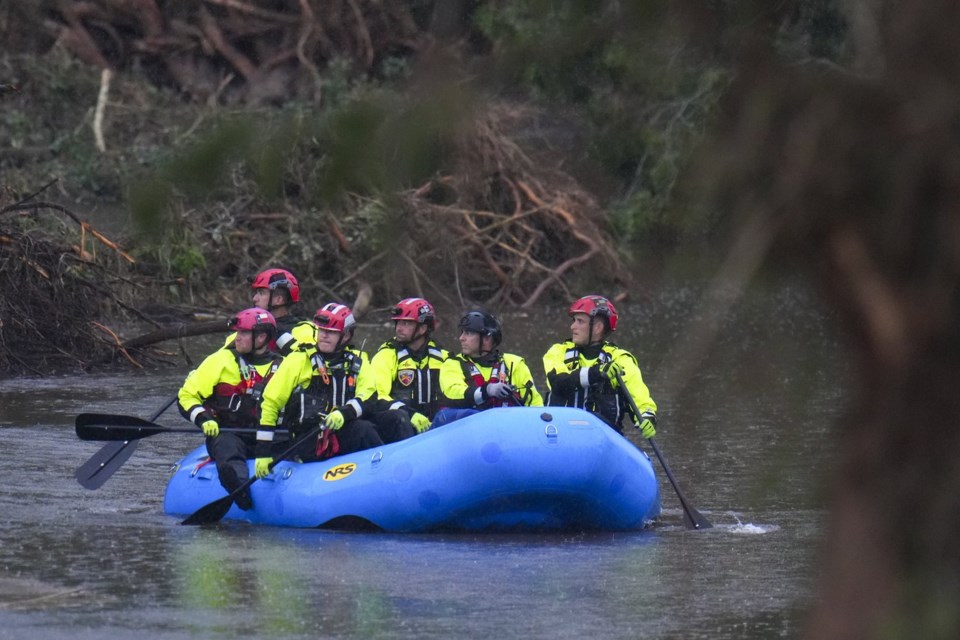WASHINGTON (AP) — Most of the U.S. adults who have experienced major flooding in the past five years think climate change was at least a partial cause, according to polling conducted earlier this year, before the deadly Texas floods.
But while Americans largely believed the federal government should play a major role in preparing for and responding to natural disasters, an analysis of recent AP-NORC polls shows less consensus about whether the government should be involved in combating climate change to try to keep extreme weather from getting worse.
The polls from The Associated Press-NORC Center for Public Affairs Research were conducted in February and June, before catastrophic flooding in Texas killed more than 100 people over the Fourth of July weekend and left others missing. The polls found that Americans generally had a high level of confidence in the National Weather Service and their local weather report, and most thought the federal government should play a central role in alerting Americans to weather events.
That trust could now be undermined, as officials face scrutiny over flood preparations and the timing of alerts and evacuations. Although meteorologists warn that human-caused climate change can make bad storms worse, it's unclear if overall views of climate change — and the government's role in combating it — will be altered.
Many have experienced recent major flooding
About 2 in 10 Americans said they had experienced major flooding in recent years, according to the February poll. And among those, about 7 in 10 said climate change was at least a partial cause of the recent weather events they had experienced.
That's in line with the share of Americans who have been affected in the past five years by any severe weather event, including extreme heat, droughts, hurricanes or extreme cold.
Those living in the Northeast and the South were more likely to say they had been personally impacted by major flooding in recent years.
Most see a role for government in tracking weather events
About 7 in 10 Americans believe the federal government should have a “major role” in tracking weather events and warning people about them, according to AP-NORC polling from June.
That includes about 8 in 10 Democrats, compared with roughly two-thirds of Republicans.
About 8 in 10 Americans want the government to provide aid to affected communities and help with rebuilding efforts, the June poll found. But there was less agreement on whether the government should be combating climate change to try to keep extreme weather from getting worse.
Just over half, 56%, of U.S. adults say the government should have a key role in combating climate change to try to prevent extreme weather from worsening. Scientists have said climate change has led to frequent and more extreme alterations in weather patterns. About 8 in 10 Democrats say the government should play a major role in fighting climate change, compared with about 3 in 10 Republicans.
Confidence in the National Weather Service was high before the floods
Following the disaster, National Weather Service and local officials disagreed about who was ultimately to blame for the lack of awareness about the flood severity.
The AP-NORC polling showed that before the Texas floods, Americans placed a relatively high level of trust in the National Weather Service and their local weather report. About 4 in 10 U.S. adults said in the June survey that they were “extremely” or “very” confident in the National Weather Service or their local weather provider. Another 4 in 10, roughly, were “somewhat confident” in the National Weather Service or their local weather report.
Confidence in the Federal Emergency Management Agency was lower. Before the floods, only about 2 in 10 U.S. adults said they were “extremely” or “very” confident in FEMA, while about 4 in 10 said they were “somewhat" confident.
___
The Associated Press’ climate and environmental coverage receives financial support from multiple private foundations. The AP is solely responsible for all content. Find the AP’s standards for working with philanthropies, a list of supporters and funded coverage areas at AP.org.
Linley Sanders And Amelia Thomson-deveaux, The Associated Press


